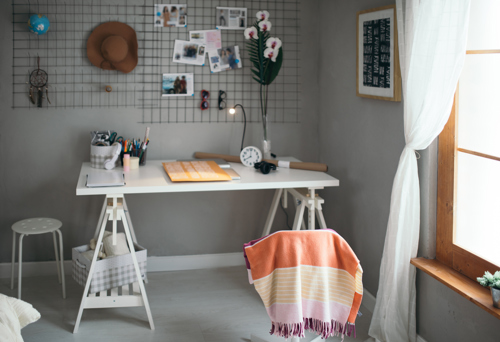As a college student, you’ll spend a significant amount of time in your study space. Though it may not seem like a big deal, the way you organize your study area — from the level of noise to the colors, filing systems and lighting — can have an impact on your mood, energy and even productivity levels. (Studies have shown that clutter can increase procrastination, trigger avoidance strategies and lead to higher levels of cortisol, the stress hormone.)
That said, you don’t have to have a lot of interior design savvy to improve your study space. Whether you’re still living at home or setting up your college dorm, here are our tips on creating a study room design that matches your style and helps you stay organized, clear-headed and productive.
- Find a Quiet Space
- Remove Clutter From Your Desk
- Color Code Your Materials
- Organize Online Files
- Keep Chargers and Electronic Devices in One Place
- Have a Variety of Writing Instruments
- Experiment With Lighting
- Have Easy Access to Everything You May Need
- Invest in Comfortable Office Furniture
- Keep Decor Personal and Minimal
- Clean Often
1. Find a Quiet Space
It’s important to limit distractions so that you can stay on task. Background noise, like soft music or the ambient sounds of a cafe or library, can be beneficial to your productivity as you can tune it out when needed to stay focussed. But setting a TV show or movie in the background, or studying in a particularly crowded common area can disrupt your attention and focus. If you don’t have enough space to dedicate to a specific or isolated quiet study area, invest in some quality earplugs or noise-canceling headphones.

2. Remove Clutter From Your Desk
Clutter on your work surface isn't just an eyesore — it minimizes the amount of space you have and can lead to increased stress. If you’re converting an old room into an office, or you’re moving into a shared dorm, it’s wise to invest in a storage unit to store the items you want to keep in good condition but don’t currently need on hand. Having an external storage unit can cut down on the number of things you need to keep immediately around you, which can help create a space that is clean, clear and limits distractions. This can help you stay on task while studying, and make your living space that much more enjoyable to be in.
3. Color Code Your Materials
Color coordination is a great mnemonic device. Assigning a specific color to a task, day of the week, or category of assignments can help you develop a clearer and quicker understanding of what needs your attention first. This helps cut down on the time you need to spend organizing your tasks, rather than completing them.
If your materials are digital, you can color-code your calendar events and emails by creating labels for different classes or use apps like Todoist (which comes with color-coded labels, subtasks, productivity visualizations, reminders and more) to keep track of the things you need to check off.
4. Organize Online Files
Because so much of our school and work lives happen online today, it’s crucial to have an organized internal database. Having an easily navigable portfolio of your digital documents can help add efficiency to your online work. Having to hunt for the fifth version of that midterm, or the most updated syllabus from your professor takes up time and exhausts mental space. Keep your document names clear, keep important and frequently consulted documents bookmarked, and if you have to keep past versions of documents, keep them in a separately labeled folder.
5. Keep Chargers and Electronic Devices in One Place
Not only does organizing your electronics cut down on unseemly wires and cluttered outlets, but it also trains your brain to recognize one space as a designated device zone. Untethering yourself from your devices, even for 20 minutes while they charge, can provide a nice and welcomed brain break.
6. Have a Variety of Writing Instruments
Having a variety of writing utensils — especially ones that are enjoyable to use — can make note-taking or studying that much achievable, and can therefore help you stay focused. You don’t have to go out and buy a diamond fountain pen — pencils in a collection of colors you like, or a brand of pens with features you enjoy will work just as well.
7. Experiment With Lighting
Lighting, both natural and artificial, can affect and influence our moods. Different colors and intensities of light can cause us to feel different things. When you’re studying, try sitting in front of a window to reduce stress, or use bright lamp light to increase energy if you’re studying later in the day.
8. Have Easy Access to Everything You May Need
Once you’ve sorted everything you want to keep and store in a storage unit, take a moment to organize your living space in a way that is accessible and neat. Invest in an accordion folder with tab labels for easy access to physical documents, or a tiered shelving unit to maximize storage in small spaces.
9. Invest in Comfortable Office Furniture
In order to make yourself study or work productively on a recurring basis, your office or study space needs to be inviting. No one wants to sit in an uncomfortable chair at an uncomfortable angle for hours. Invest in an office chair that is sturdy and offers back support, as well as a desk that sits at an ergonomic height.

10. Keep Decor Personal and Minimal
Keeping decorative elements more minimalist is another way to help declutter and stay focused in your study area. Having a clear design idea or theme, and keeping your personal keepsakes organized in scrapbooks or frames, reduces the feeling of busyness or unrest in your surroundings. This can allow you to settle into your work or school easier.
11. Clean Often
Having a clean living and working space can make your space feel more efficient and inviting. It’s also important to keep your living space clean to keep unwanted visitors like bed bugs or ants from moving into your productive space and disrupting your focus and flow.
Creating a working space that is inviting and organized is key to staying on task and becoming the most productive version of yourself that you can be. Whether studying for school, working from home, or improving your overall living space, these easy tips can guide you toward a focused, productive, and efficient lifestyle.









